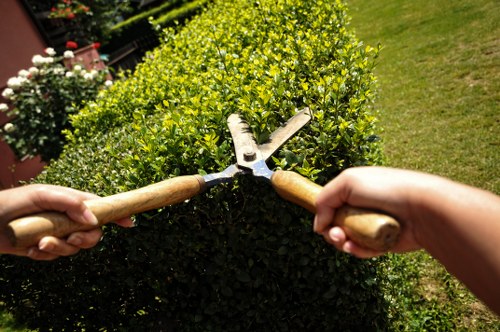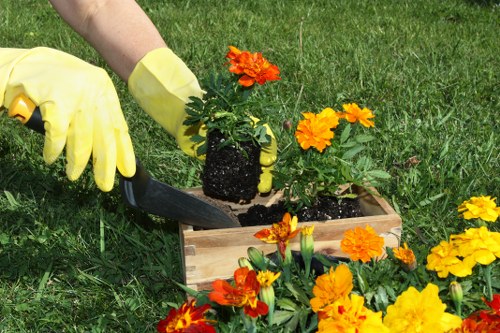Comprehensive Guide to Garden Maintenance in Sudbury
Introduction to Garden Maintenance in Sudbury

Maintaining a beautiful garden in Sudbury requires understanding the local climate, soil conditions, and plant varieties. Whether you're a seasoned gardener or a beginner, proper garden maintenance ensures your outdoor space remains vibrant and healthy throughout the year.
Sudbury's climate presents unique challenges and opportunities for garden enthusiasts. With cold winters and warm summers, choosing the right plants and maintenance techniques is crucial for a thriving garden.
In this article, we'll explore essential garden maintenance practices tailored to Sudbury's environment, helping you create and sustain a picturesque and resilient garden.
Understanding the Sudbury Climate

Sudbury experiences a continental climate characterized by significant temperature variations between seasons. Winters can be harsh, with heavy snowfall and freezing temperatures, while summers are warm and conducive to plant growth.
Understanding these seasonal changes is fundamental for effective garden maintenance. It influences planting schedules, soil preparation, and the selection of plant species that can withstand Sudbury’s climatic extremes.
Let’s delve deeper into how each season affects your garden and the best practices to adapt accordingly.
Seasonal Garden Maintenance

Successful garden maintenance in Sudbury involves adapting your care routines to each season’s demands. Here’s a breakdown of essential tasks for spring, summer, fall, and winter.
Spring Maintenance
- Soil Preparation: Test and amend soil to ensure optimal nutrient levels.
- Planting: Choose cold-resistant plants to establish a strong foundation.
- Pruning: Trim dead or damaged branches to promote healthy growth.
Spring is the perfect time to rejuvenate your garden after winter dormancy.
Summer Maintenance
- Watering: Ensure consistent moisture without overwatering.
- Weeding: Regularly remove weeds to reduce competition for resources.
- Mulching: Apply mulch to retain soil moisture and suppress weeds.
Summer’s warmth accelerates plant growth, making vigilance essential.
Fall Maintenance
- Leaf Cleanup: Remove fallen leaves to prevent mold and pests.
- Planting Bulbs: Prepare for spring blooms by planting bulbs now.
- Soil Enrichment: Add compost to enhance soil fertility for the next growing season.
Fall is a time to prepare your garden for the upcoming winter, ensuring it remains healthy and ready for spring.
Winter Maintenance
- Protecting Plants: Use covers or mulches to shield plants from frost.
- Tool Care: Clean and store garden tools properly to extend their lifespan.
- Planning: Assess your garden’s progress and plan for improvements.
Winter allows for reflection and preparation, setting the stage for a successful gardening year ahead.
Soil Management in Sudbury

The foundation of any thriving garden is healthy soil. Sudbury’s soil can vary, so understanding its composition is key to effective maintenance.
Soil Testing
Conducting a soil test helps identify pH levels, nutrient deficiencies, and soil composition. This information guides the appropriate amendments needed for optimal plant growth.
Amending the Soil
Based on soil test results, incorporate organic matter such as compost or manure to improve soil structure and fertility. Adjust pH levels using lime or sulfur as necessary.
Mulching
Applying mulch not only conserves moisture but also enriches the soil as it decomposes, providing a steady supply of nutrients to your plants.
Choosing the Right Plants

Selecting plants that thrive in Sudbury’s climate is essential for a low-maintenance and resilient garden. Here are some tips for choosing the right flora:
Native Plants
Native plants are adapted to Sudbury’s environment, making them more resistant to local pests and diseases while requiring less maintenance.
Perennials vs. Annuals
Perennials return year after year, providing long-term structure to your garden, whereas annuals offer seasonal color but require replanting each year.
Drought-Tolerant Varieties
Select plants that can withstand dry periods, reducing the need for frequent watering and ensuring sustained growth during summer months.
Recommended Plants for Sudbury Gardens
- Hostas: Perfect for shade and low-maintenance.
- Daylilies: Vibrant and drought-resistant flowers.
- Conifers: Provide year-round structure and greenery.
- Roses: Classic blooms that can thrive with proper care.
- Lavender: Aromatic and attracts beneficial insects.
Irrigation Techniques
Effective watering is crucial for garden health, especially in Sudbury’s variable climate. Implementing efficient irrigation techniques can save water and ensure your plants receive adequate moisture.
Drip Irrigation
Drip irrigation delivers water directly to the plant roots, minimizing evaporation and reducing water waste.
Rainwater Harvesting
Collecting and utilizing rainwater for your garden reduces reliance on municipal water sources and promotes sustainability.
Proper Watering Schedule
Water your garden early in the morning or late in the evening to minimize evaporation and ensure deeper root absorption.
Tips for Efficient Irrigation
- Use mulch to retain soil moisture.
- Monitor soil moisture levels regularly.
- Adjust watering based on seasonal changes.
Implementing these strategies ensures your garden remains hydrated and healthy throughout the seasons.
Pest and Disease Management
Maintaining a garden in Sudbury involves protecting your plants from pests and diseases. Effective management strategies promote plant health and prevent infestations.
Integrated Pest Management (IPM)
IPM combines biological, cultural, and chemical practices to manage pests sustainably.
Natural Remedies
Utilize natural predators, such as ladybugs, and organic sprays to control pest populations without harming beneficial insects.
Preventative Measures
Regularly inspect plants for signs of disease and remove affected areas promptly to prevent spread.
Common Pests in Sudbury Gardens
- Aphids
- Spider Mites
- Slugs and Snails
- Japanese Beetles
- Powdery Mildew
By staying vigilant and applying appropriate treatments, you can maintain a healthy and vibrant garden.
Pruning and Trimming
Regular pruning and trimming are essential for maintaining plant health and aesthetics. Proper techniques encourage growth, improve air circulation, and enhance the overall appearance of your garden.
When to Prune
Different plants have specific pruning schedules. Generally, late winter or early spring is ideal for most shrubs and trees, while deadheading annuals should be done throughout the growing season.
Pruning Techniques
Use sharp, clean tools to make precise cuts. Remove dead or diseased branches first, followed by shaping to encourage desired growth patterns.
Tools for Pruning
- Pruning Shears
- Hand Saws
- loppers for thicker branches
- Secateurs for detailed work
- Gloves to protect your hands
Investing in quality tools ensures efficient and effective pruning, contributing to the long-term health of your garden.
Benefits of Regular Pruning
Regular pruning:
- Prevents plant diseases
- Encourages healthy growth
- Improves plant aesthetics
- Enhances fruit and flower production
- Maintains plant size and shape
Fertilizing Your Garden
Fertilizing provides essential nutrients that support plant growth and development. Proper fertilization practices ensure your garden remains lush and productive.
Types of Fertilizers
- Organic Fertilizers: Compost, manure, and bone meal improve soil health and provide slow-release nutrients.
- Inorganic Fertilizers: Synthetic options offer quick nutrient availability but require careful application to avoid over-fertilization.
- Liquid Fertilizers: Easily absorbed by plants, suitable for immediate nutrient needs.
- Granular Fertilizers: Provide long-term nutrient release, ideal for established gardens.
Fertilizing Schedule
Establish a fertilizing routine based on plant types and seasonal growth patterns. Typically, fertilize in early spring, mid-summer, and early fall to support continuous growth.
Application Techniques
Apply fertilizers evenly around the plant base, avoiding direct contact with stems and leaves to prevent burning. Follow manufacturer instructions for dosage and frequency.
Signs of Nutrient Deficiency
- Yellowing leaves
- Stunted growth
- Poor flowering or fruiting
- Weak stems
- Leaf discoloration
Identifying and addressing nutrient deficiencies promptly ensures your plants remain healthy and vigorous.
Weed Control Strategies
Weeds compete with your garden plants for nutrients, water, and sunlight, making effective weed control essential for maintaining a healthy garden.
Manual Weeding
Hand-pulling or hoeing weeds is an effective and environmentally friendly method, especially for small gardens.
Mulching
Applying a layer of mulch suppresses weed growth by blocking sunlight and creating a barrier that inhibits weed seed germination.
Herbicides
Use selective herbicides to target specific weed types without harming your desirable plants. Always follow safety guidelines when applying chemicals.
Preventative Weed Management
- Maintain healthy soil to prevent weed infestation.
- Plant densely to reduce available space for weeds.
- Regularly inspect and remove emerging weeds.
Consistent weed management practices keep your garden neat and competitive for resources.
Lawn Care in Sudbury
A well-maintained lawn enhances the overall appeal of your garden. Here are key lawn care practices tailored for Sudbury’s climate.
Mowing Techniques
Mow your lawn at the correct height to promote healthy growth. Typically, keep grass at 2.5 to 3 inches to shade the soil and retain moisture.
Fertilization
Fertilize your lawn in the spring and fall to support robust growth and resilience against pests and diseases.
Irrigation
Water your lawn deeply and infrequently to encourage deep root growth. Early morning watering reduces evaporation and disease risk.
Common Lawn Issues in Sudbury
- Grub Infestations
- Brown Patches
- Weed Encroachment
- Thatch Buildup
- Fungal Diseases
Addressing these issues promptly ensures your lawn remains lush and healthy throughout the year.
Hardscape Maintenance
Hardscape elements like pathways, patios, and fences add structure and functionality to your garden. Proper maintenance ensures these features remain attractive and durable.
Pathway Upkeep
Regularly clean and repair pathways to prevent tripping hazards and maintain their aesthetic appeal.
Patio Maintenance
Seal and clean patios to protect against weather damage and preserve their appearance.
Fence Care
Inspect fences for damage or rot and perform necessary repairs or painting to extend their lifespan.
Tools for Hardscape Maintenance
- Brooms and Brushes
- Pressure Washers
- Sealants and Paints
- Repair Kits
- Protective Gear
Equipping yourself with the right tools makes hardscape maintenance tasks more manageable and effective.
Garden Tools and Equipment
Having the right tools is essential for efficient garden maintenance. Here’s a list of must-have tools for Sudbury gardeners.
Basic Tools
- Spade and Shovel
- Garden Fork
- Pruning Shears
- Hand Trowel
- Rake
Specialized Tools
- Loppers for thick branches
- Hedge Trimmers
- Garden Hose with Adjustable Nozzle
- Wheelbarrow for transporting materials
- Compost Bin for organic waste
Maintenance Tips for Tools
Regularly clean, sharpen, and store your garden tools properly to extend their lifespan and ensure they perform effectively.
Essential Garden Equipment
Investing in quality equipment not only makes maintenance tasks easier but also enhances the overall health and appearance of your garden.
Sustainable Gardening Practices
Adopting sustainable practices in your garden promotes environmental health and reduces your ecological footprint.
Composting
Composting recycles organic waste into valuable soil amendments, enriching your garden soil naturally.
Rainwater Harvesting
Collecting rainwater for garden use conserves water and provides a natural and chemical-free irrigation source.
Organic Gardening
Using organic fertilizers and pest control methods minimizes chemical usage, fostering a healthier ecosystem in your garden.
Benefits of Sustainable Gardening
- Reduces water consumption
- Enhances soil health
- Promotes biodiversity
- Decreases reliance on chemical inputs
- Supports long-term garden sustainability
Implementing these practices not only benefits your garden but also contributes to a healthier environment.
Join the Green Movement
Embrace sustainable gardening to create a beautiful and eco-friendly outdoor space.
Hiring Professional Garden Maintenance Services
While DIY maintenance is rewarding, sometimes hiring professionals ensures your garden receives the expertise it needs.
Benefits of Professional Services
- Expert knowledge of plant care and local conditions
- Time-saving for busy homeowners
- Access to specialized tools and equipment
- Comprehensive maintenance plans tailored to your garden
- Enhanced garden aesthetics and health
Choosing the Right Service Provider
When selecting a garden maintenance service in Sudbury, consider their experience, range of services, customer reviews, and pricing to ensure they meet your garden’s specific needs.
Questions to Ask Potential Providers
- What services do you offer?
- Do you have experience with Sudbury’s climate?
- Can you provide references or examples of past work?
- What is your pricing structure?
- How do you handle pest and disease management?
Ensuring you choose a reputable and knowledgeable provider guarantees your garden maintenance is in capable hands.
DIY Garden Maintenance Tips
For those who prefer hands-on gardening, here are some practical DIY tips to maintain your Sudbury garden effectively.
Regular Inspection
Frequently check your plants for signs of stress, pests, or disease, allowing you to address issues promptly.
Effective Pruning
Learn proper pruning techniques to promote healthy plant growth and maintain garden structure.
Efficient Watering
Implement watering schedules and techniques that ensure your plants receive adequate moisture without overwatering.
DIY Maintenance Tools
- Handheld pruners
- Garden gloves
- Watering cans or hoses
- Weeding tools
- Soil testers
Equipping yourself with the right tools and knowledge makes DIY garden maintenance manageable and enjoyable.
Conclusion
Maintaining a garden in Sudbury is a rewarding endeavor that combines beauty, sustainability, and personal satisfaction. By understanding the local climate, implementing effective maintenance practices, and choosing the right plants and tools, you can cultivate a thriving and resilient garden.
Whether you opt for DIY maintenance or hire professional services, dedicating time and effort to your garden ensures it remains a vibrant and enjoyable space all year round.
Get Started Today
Contact us today to learn more about our garden maintenance services in Sudbury and take the first step towards a stunning and healthy garden.